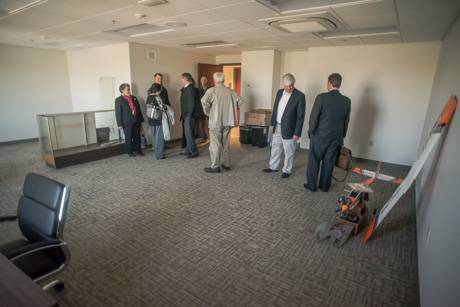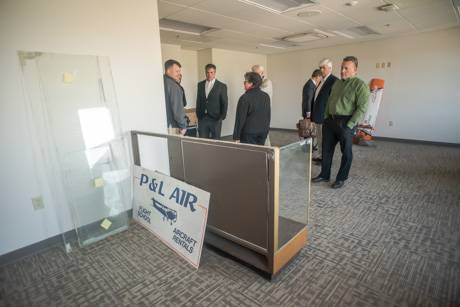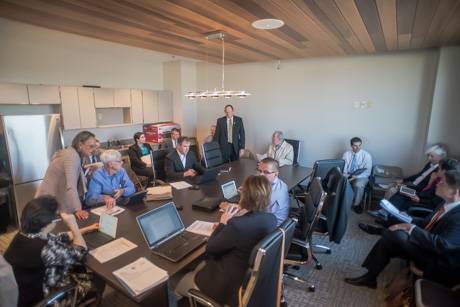The fight over live music and other alleged zoning code violations at Frost Ridge Campground is far from over and court documents indicate the fight has recently involved some name calling and an accusation of anti-gay bias driving the attempts to shut down the park.
Attorneys for David and Marney Cleere and Scott and Betsy Collins, neighbors of Frost Ridge, have filed motions seeking a permanent ban on live, amplified music and long-term camping at the facility.
Their court papers alleged that a ZBA hearing in February that led to a finding in favor of David and Greg Luetticke-Archbell, owners of Frost Ridge, violated the state's opening meeting law and therefore the ZBA's decision should be voided.
The Luetticke-Archbell's position is that the meeting was given proper public notice, a position backed by sworn statements from the ZBA's then-chairwoman Debbie Jackett and answer filed by the ZBA's attorney, James M. Wujcik.
Any appearance of inconsistencies in the ZBA's actions, before being disbanded by the town board, is purely the result of the anti-gay bias, David Luetticke-Archbell claims in a sworn statement, of Town Supervisor Steve Barbeau.
It's a charge that Barbeau vehemently denies in his own sworn affidavit, but Luetticke-Archbell accuses Barbeau of calling his husband a "faggot" after a "contentious" Nov. 12 meeting. To support his charge of an anti-gay agenda, Luetticke-Archbell also points to several actions by Barbeau throughout the legal and civic process over the past couple of years, including a statement in a court filing approved by Barbeau that Frost Ridge is a "malignancy which cannot be allowed to metastasize."
"Mr. Barbeau, with the Town Board in tow, has unabashedly trampled on the due process rights my husband Greg and I would have been afforded but for our sexual orientation," Luetticke-Archbell wrote in his statement.
Barbeau said that Luetticke-Archbell didn't tell the whole story of the events of Nov. 12. First, he denies using the word "faggot," but he also accused Greg of calling him a couple of choice names while following him into his office after the meeting, including a "piece of shit."
In his statement, Barbeau states he holds no bias against the owners of Frost Ridge.
"The Luetticke-Archbells have a place in the Town of Le Roy, one they have earned through their commercial and charitable efforts," Barbeau states. "The Town of Le Roy is merely trying to enforce its zoning ordinance so as to not render it irrelevant."
Barbeau said that the actions he and the town board have taken have been supported by a majority of town residents. The evidence is in the election results, he said, given that he and other incumbents handily won reelection despite opposition focused on the Frost Ridge issue.
David Luetticke-Archbell is equally convinced that Barbeau is driven by an anti-gay agenda.
Besides the slurs, Luetticke-Archbell says Barbeau's pattern of actions is further evidence of his anti-gay position.
He accused Barbeau, rather than code enforcement officer Jeff Steinbrenner, of drafting an e-mail denying Frost Ridge prior, non-conforming use status; of purposefully mucking up the application process on a couple of occasions; of usurping the independence of the Zoning Board of Appeals by filing court documents on its behalf without properly notifying the ZBA of the proceedings; of then wrongly admitting to adverse allegations of improper conduct by the ZBA; and, of illegally firing the previous ZBA attorney and then appointing an attorney who works in the same law office as the town attorney's son.
"Mr. Barbeau's motivations and actions here have always been and remain malicious," Luetticke-Archbell wrote in his statement. "His allegations, if considered at all, should be weighed accordingly."
Barbeau called Luetticke-Archbell's affidavit an ad hominem attack and asked that it be stricken from the record.
The attorney Barbeau appointed is James Wujcik, who continues to represent the ZBA and filed documents in the current court battle defending the ZBA against allegations leveled by the attorneys for the Cleeres and Collins.
As for the motion for injunction filed by Mindy L. Zoghlin, attorneys for Cleere and Collins, it's long (32 pages) and legal, and the responses from David Roach, attorney for Frost Ridge, are also detailed.
Whereas in the first round of lawsuits, it was Cleere and Collins along with the Town of Le Roy against Frost Ridge, Luetticke-Archbell and the ZBA, the new motion names the Town of Le Roy as a defendant.
The Town of Le Roy is accused of not upholding its own zoning laws.
It accuses Frost Ridge of violating town ordinances by allowing permanent RV camping, of violating the noise ordinance, of relying on a defective ZBA interpretation of the law, and of violating Judge Robert C. Noonan's preliminary injunction against amplified live music that he issued in September 2014 by allowing live amplified music before 4 p.m.
It accused the ZBA of violating the open meeting law after the case was remanded back to the ZBA for a determination on whether live, amplified music is a prior, non-conforming use. The suit accuses of the ZBA of not providing proper public notice and of not deliberating its decision in public.
In his response, Roach denies all the substantial allegations.
Acting Superior Court Judge Emilio Colaiacovo is expected to make a ruling on the current set of motions at a later date.





















